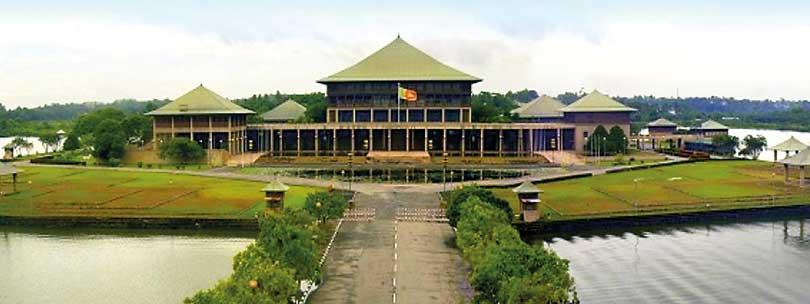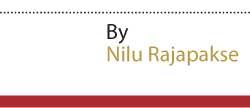06 Mar 2019 - {{hitsCtrl.values.hits}}

 The government-led initiative to introduce a new constitution is being met with wide and conflicting reactions from civil society. Those opposing warn a de facto federalist structure of Government, while advocators insist that it fulfills a long-felt necessity for a “People’s Constitution”. The two facts are politically divided, and there seems to be some merit in both sides of the argument. The government’s stance to most critics is that the draft constitution is still open to debate and further improvement.Some key elements are discussed below by experts in the domain, and the author’s observations at the end.
The government-led initiative to introduce a new constitution is being met with wide and conflicting reactions from civil society. Those opposing warn a de facto federalist structure of Government, while advocators insist that it fulfills a long-felt necessity for a “People’s Constitution”. The two facts are politically divided, and there seems to be some merit in both sides of the argument. The government’s stance to most critics is that the draft constitution is still open to debate and further improvement.Some key elements are discussed below by experts in the domain, and the author’s observations at the end.
That Sri Lanka needs a “People’s Constitution” similar to India, to be universally revered and upheld by every citizen as the Supreme Law, is the view of Chairman of the Committee on Public Representations (CPR) Lal Wijenayake. Defining the basis of the proposed Constitution he says that equality, non-discrimination and power sharing can create an atmosphere for national integration. Both republican constitutions (1972 and 1978) were drafted by the governing party at the time, and failed to address the aspirations of the entire populace, says Wijenayake. He further proposes that Sri Lanka should be a ‘welfare state’ similar to 1946-1978 era, when people enjoyed ‘economic democracy’, and agrees with the ‘entrenched’ Articles relating to a Unitary State, language and Buddhism.
Constitutional Law expert and former UN Permanent Representative in Vienna, Dayantha Laksiri Mendis’ notes that Section 29 of the Soulbury Constitution failed to assure racial equality. He points out that the subsequent Citizenship Act and Language provisions were responsible for festering unrest in ethic minorities.
A Senate or second chamber is proposed to delegate State power, as supporters perceive power sharing as the underlying cause of unrest of the ethnic minority. Additionally, more power shall be devolved to Provincial Councils (PCs). “Safeguards are there,” Wijenayake counters, “because the President has the power to dissolve any PC,if there is an attempt to violate the constitution. The Constitution is supreme, and cannot be meddled with” he stresses, adding that this is the first time a constitution is being prepared as a multi-party exercise.
However, as an alternative to a ‘political body’ such as a Senate, Mendis recommends a Conseil d’État, as in France, consisting of ‘non-political’expert members. The Council could monitor and improve legislative content with unbiased national interest, while maintaining a global outlook.
Although proportional representation is heavily criticised, and election mandates have repeatedly pledged alteration, for obvious reasons the ruling (covertly) and minority parties (overtly) continue to preserve it. Constitutional Law expert Kalyananda Thiranagama alleges that the proposed constitution is geared only to satisfy the demand of minority parties, and that the actual grievances such as the present electoral system are ignored. “It is not intended to improve the administrative system, or the wellbeing of the country as a whole”, he criticizes.
The real problem,Thiranagama points out,lies in party constitutions. It is responsible for creating a dictator in the presiding President or Prime Minister. This is a potentially ‘piquant’ situation, prophetically described by Dr. N.M. Perera. For a democratic Parliament, it must first reflect in party constitutions, he asserts.
Mendis also agrees, drawing an example from ‘one-party’ constitutions in the African continent,which failed because party constitutions were not based on democratic principles.
Can the Parliamentary System be superior to Executive Presidency? Lord Hailsham, when describing the phenomenon of Elective Dictatorship in 1976, argued that Parliamentary System could also produce dictators. Margaret Thatcher and Eugene Charles of Dominica were good examples of highly authoritarian Prime Ministers. Hence Mendis suggests that the President should be elected by Parliament as per JVP recommendation, with a two-third majority and dismissal only by two-thirds majority or dissolution of Parliament.
Mendis also suggests that Committee stage amendments that go beyond the scope and content of the draft Bill,should be possible to be challenged in the Supreme Court.Otherwise, he warns,it would deprive People of the power to ensure legislation is consistent with the Constitution.The present process of legislation entails loopholes permitting Parliament to pass legislation, which cannot later be challenged in court. Conversely, if legislation can be annulled even after several years as unconstitutional, it would result in tremendous economic cost and uncertainty of the Law.
Completely abolishing the Constitutional Council could be ‘throwing the baby with the bathwater’, says Mendis. The purposed of the 17th Amendment intended depoliticize executive action and the initial draft had comprised of majority civil society members and less political members. However, this reversed during Committee stage. Mendis points out that if this is rectified, the desired original purpose would be preserved.
There seems to be confusion whether Sri Lanka is a Dualist or Monist country in the proposed Constitution, which allows International treaties ratified by Sri Lanka to be given automatic effect after two years. “This is extraordinary. Such confusion is highly unadvisable.” Mendis warns.
Providing better services and improving the livelihood of the country is a must. But including socio-economic elements in Fundamental Rights would create a situation where the Courts and the Legislature would constantly be at loggerheads, with Judges having to make decisions on economic issues.Mendis suggests that they should ideally be addressed in the Directive Principles of State Policy.
Thatcher made the above observation, when she described the breadth of detail to which regulations extended. Along similar lines, Mendis recommends certain matters relating to Parliamentary Procedure and Practices to be relegated to Parliamentary Standing Orders, for ease of amendment if and when desired.Accordingly, he recommends a shorter constitution, complemented by more detailed regulations as more appropriate than an expanded Constitution, which he warns could pose rigidity and limitations in the governance process.
Looking from a historical and political perspective, Mendis points out that Constitutional Law is a mixture of Law and Politics. “In Constitution making, we must not think dei novo (anew) but try to eliminate the defects”, he asserts,”it must relate to the existing Constitution and follow the principle of continuity and change. If you dismiss the political context, it is a serious misnomer”. He cautions that each challenge to the new constitution must be considered carefully, as people’s consensus is essential.
The real and fundamental issue in today’s world lies in an altogether different dimension, one can’t help feeling. Looking at a country from a modern perspective, the basis for changing a constitution should be more along secular lines.Hence choosing a particular constitutional model should be based on factors such as improved administrative efficiency, rule of law, greater fairness and opportunities for socioeconomic growth, looking at the basic administrative unit as the individual. The Administrative Appeals Tribunal is a positive feature, as it would enable scrutiny and challenge of undesirable administrative action.
Discussion of the merits of removing a clause in trying to improve administration of a country should be welcomed and entertained, based on empirical evidence. Preservation of cultural inheritances is admirable, but even indirect pandering to administration based on group-identities is a slippery slope.When the enlightened world is shifting from tribalism towards a single global identity, we are mistaken to think that tribal ideology should be given administrative identity.
They say ‘Two wrongs don’t make a right’. If the rationale for constitutional change is to appease a section for past wrongdoings based on race or caste, such divisive approach would be unacceptable in an enlightened society. Countries in Scandinavia, for example, are focusing on improving scientific governance by introducing more fair or efficient ways of collaboration. If there were a federal system, it would be for better administration, unifying different sociocultural groups, and empowering local government.
Completely abolishing the Constitutional Council could be ‘throwing the baby with the bathwater’, says Mendis
The purpose in having an Executive President is to make quick decisions, free of party bias, in times of national emergency. If Executive Presidency is to be discarded, it should be to avoid a ‘piquant situation’, or because the country no longer requires it. However, it is essential that the Presidential profile be that of an intellectual of exceptional capability, with high moral standing, and the ability to muster a good advisory panel. Most essentially, the President should be politically neutral once elected to office. Such a President would be suitably empowered and dedicated to take action in the National interest.
At the root, party constitutions should conform to democratic principles,and the election of party leaders must adhere to the democratic process. This would ensure party members holding office are free of conflict of interest, and fully committed to act on behalf of their electorate.Furthermore, party members must be able to challenge their party constitution,and prevent party leaders wielding Ad infinitum (everlasting) power.
In conclusion, it is better to have an amendment to the constitution rather than a new constitution for Sri Lanka. However, if we opt for a new constitution, underlying rationale must be secular and not based on ethnic, religious or cultural grounds. Furthermore, to render a truly “People’s Constitution”, no one’s opinion must be left out from it, whether it be minority or majority.
“For Forms of Government let fools contest;
whatever is best administered is best”.
Alexander Pope
27 Oct 2024 4 hours ago
26 Oct 2024 8 hours ago
26 Oct 2024 26 Oct 2024
26 Oct 2024 26 Oct 2024
26 Oct 2024 26 Oct 2024